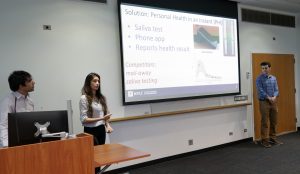2019 Pre-capstone Innovation Course Presentations
May 28, 2019
2019 Pre-Capstone Course Final Presentations Showcases Innovative Prototypes
By Md Shamim Reza and James Perez
The final presentation for 2019 Pre-Capstone Innovation course took place on May 9th, with an impressive set of presentations. The VentureWell supported course was designed for students to embrace design thinking and the customer discovery processes and provided with multidisciplinary engineering prototyping tools ranging from biological engineering to circuit design. Taught by Professors Sara Thermer, Jin Kim Montclare, Michael Knox and Vittoria Flamini, the course enabled students predominantly in their junior years to work in teams, address a societal problem, and develop prototype solutions.
The student teams tackled meaningful challenges across diverse sectors from healthcare to accessibility technology, and personal well being. Each team was required to provide a 10-minute summary of their concept and how it addressed a problem, the number of interviews they conducted, lessons learned from their interviews, and what their ultimate solution/prototype is to address the problem.

Above: 2019 Precapstone Innovation Course participants alongside faculty judges (Left to Right): David Bravo, John Knox, Mustafa Abdaal, Itzel Villavazo Salinas, Claudia Rodriguez, Martha Rajewski, Gabrielle Fisher, Professors Sara Thermer, Jin Kim Montclare, David Lefer and Michael Knox
INDI
- Participants: David Bravo (Computer Science, Tandon ‘21), Martha Rajewski (Chemical and Biomolecular Engineering, Tandon ‘21).
- About: Smart cane for visually impaired person.
David and Martha from team INDI presented their idea about a smart cane that is capable of detecting an obstacle for visually impaired individuals. From their market analysis and customer interviews, they found that there were similar products already available in the market and most of them were very expensive. Therefore, their idea was to create a low-cost attachment to existing canes. Team INDI presented their first smart cane prototype which was integrated with raspberry pi instead of a smartphone to keep the cost as low as possible. Currently, their prototype is only able to detect a person and they are working on more machine learning algorithms to detect a list of obstacles individual would come across in daily life.

Above: Team INDI, David Bravo and Martha Rajewski
PHI-Personal Healthcare in an Instant
- Participants: John Knox (Computer Science, Tandon ‘20), Itzel Villavazo Salinas (Biomolecular Science, Tandon ‘20), Mustafa Abdaal (Electrical and Systems Engineering, Tandon ’20)
- About: Instant hormone detection
John, Itzel and Mustafa from team PHI presented their idea of instant hormone detection kit. As a proof of concept of their business model, they developed a salivary cortisol assay kit that can be read by a smartphone. Since cortisol is a biomarker of psychological stress, a DIY salivary tests may can enable individuals to identify hormonal imbalances without seeing a doctor as one traditionally does. Based on their market research and customer interviews, team PHI thinks that the availability of more sophisticated and convenient analytic techniques, like their salivary cortisol assay kit, will eventually become the tool required for precise treatment planning.

Above: Team PHI, (Left to Right) Mustafa Abdaal, Itzel Villavazo Salinas and John Knox
Handless Umbrella
- Participants: Gabrielle Fisher (Electrical Engineering, Tandon ‘20), Claudia Rodriguez (Computer Science, Tandon ‘20).
- About: Handless umbrella for electric wheelchair.
Gabrielle and Claudia presented their idea of a ‘Handless Umbrella’ based on their market research and customer interviews. During their interviews with mothers with strollers, they found that motherly instinct will do whatever it takes to keep their children out of the rain in a rainy day. They also found that holding an umbrella in a rainy day is also very difficult for a disabled person particularly on a wheel chair. Therefore, they came out with a business plan of automated handless umbrella for strollers and electric wheelchairs. They presented their first prototype of handless automated umbrella in the presentation and explained their journey of struggles to make it work properly. They are now working on their 2nd prototype which will open up by itself after coming in contact with rain drop and also will have strong wind resistance.

Above: Team Handless Umbrella, (left to Right) Gabrielle Fisher and Claudia Rodriguez
Overall, as students developed their prototypes, some reflected on what insight they gained from the program. One student David Bravo from team INDI explained his own journey in studying machine learning for developing an obstacle detecting algorithm for their smart cane. Moreover, all the participating students complimented the program on how it gave them “better insight into the business world,” and exposed the course material “fast and more in-depth than normal.” They also reflected on the program’s benefit for future student innovators, indicating that the program provided a “nice break from the usual strict, structured classes,” and gave them a better sense on establishing quality over quantity in terms of interviewing and prototyping.
Based on this feedback, Convergence of Innovation and Entrepreneurship (CIE) institute will alter the course structure a bit, perhaps adding more labs in their upcoming semester. This Pre-Capstone course, organized by CIE, successfully encouraged the students to participate in the university’s prototyping competition, Innovation and CIE will follow up their progress. In the early spring, 2020, CIE will begin the next round of advertising and interviews for the selection of the next cohort starting in the fall semester 2020.
